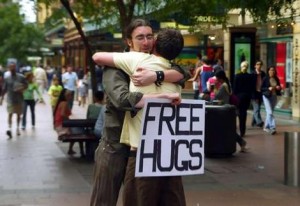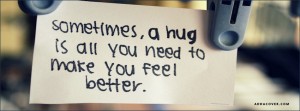While I was rushing to class yesterday I noticed a girl standing on Old Main lawn with a Free Hugs sign but thought nothing of it and did not give it much thought as I was frantically running to statistics. However, today, as I was leaving the library, feeling accomplished with the amount of work I was able to finish, I noticed once again that another person was holding another Free Hugs sign. Not in as much of a rush, I was able to stop and observe the situation. I watched as a few brave souls or those just in need of a hug approached the student with the sign, held out their arms, and were engulfed in the much-needed hug.
As he seemed genuine enough I then gained enough courage to approach this student, this stranger, and share a hug—this two-way interaction and symbol of warmth and friendliness. I thought it might be awkward and uncomfortable but it was actually a really good hug! The comforting vibes and the embrace that made me feel protected and shielded was exactly what I needed upon leaving the library on this extremely stressful day. As I walked away, smiling, I was thinking about how I really haven’t hugged anyone since coming to school. The last hug right before my parents pulled away on move-in day was the last physical embrace, the last proof of affection and love. I never realized how much I missed hugging my mom goodnight each night or just having her arms to fall into after a tough day at school. Hugs are so powerful and are something that while at school we fall away from; this is why the free hugs campaign on campus was so effective.
I was intrigued by this vulnerability it takes to stand there with the sign and the motive and thoughts behind it. This idea of standing on the street with a cardboard cut out of free hugs on it seems to be a new phenomenon as I have seen it multiple times back home in Philadelphia or on the boardwalk at the shore or in the mall. How did it begin? With research I found that the Free Hugs Campaign started with Juan Mann whose sole mission was to reach out and hug a stranger to brighten up their lives. He went back to his hometown of Sydney but had nobody to greet him, no place to call home so he decided to go to the busiest intersection with his sign saying Free Hugs in the hopes of human interaction to brightening his life as well as those who are also going through struggles. On the campaign website he states “to see someone who was once frowning, smile even for a moment, is worth it every time”.
on the street with a cardboard cut out of free hugs on it seems to be a new phenomenon as I have seen it multiple times back home in Philadelphia or on the boardwalk at the shore or in the mall. How did it begin? With research I found that the Free Hugs Campaign started with Juan Mann whose sole mission was to reach out and hug a stranger to brighten up their lives. He went back to his hometown of Sydney but had nobody to greet him, no place to call home so he decided to go to the busiest intersection with his sign saying Free Hugs in the hopes of human interaction to brightening his life as well as those who are also going through struggles. On the campaign website he states “to see someone who was once frowning, smile even for a moment, is worth it every time”.
In this age of social-disconnectedness and lack of human contact, the effects of the Free Hugs campaign became a hit and put smiles on people’s faces across the globe. These hugs are meant to be random acts of kindness—selfless acts performed just to make others feel better. A challenge to you is to give a hug to someone who needs it during these busy times of midterms and homesickness.


